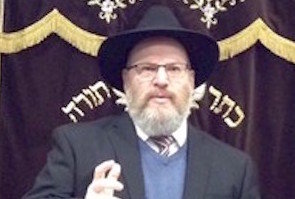Rabbi Pinchas Chatzinoff’s ‘Imrei Fi al haTorah’
Rabbi Pinchas Chatzinoff served as the Rav of the distinguished Tifereth Zvi Minyan at Yeshiva Zichron Aryeh in Bayswater since 1994. “Imrei Fi” is a powerful collection of insights into the parshah and reflects Rabbi Chatzinoff’s down-to-earth wisdom and the unique and inspiring approach that he brings to his popular shiurim.
The following insight is from this week’s parshah, Eikev:
“And now, Israel, what does Hashem, your G-d, ask of you?” (Devarim 10:12)
Moshe Rabbeinu asked bnei Yisrael rhetorically, “What does Hashem ask of you?” and then proceeded to answer that it is “merely” yiras Shamayim. The Talmud (Berachos 33b) asks whether this fear of G-d is just some small thing. The Talmud then observes that while it is certainly nothing minor, everything except each person’s own yiras Shamayim is in the absolute control of G-d.
How can we seize this yiras Shamayim, which is apparently the only thing in our control?
Obviously, the task requires some focus and refinement of our hearts and minds. The Torah commands that we “circumcise the orlah (barrier) of our hearts” (ibid. 10:16). Just as a conventional circumcision removes the foreskin barrier, so too we must lay bare our hearts in order to achieve growth in yiras Shamayim.
The heart’s “barrier” creates interference in two directions.
First, if our hearts are insulated against all that goes on around us, we fail to emote and empathize with the pain and struggles of those around us. It is our mission to rip away any barrier that would impede our ability to feel the pain of the people with whom we come in contact.
Also, a barrier would prevent us from integrating the messages of admonition and correction that we may hear for others or that we may learn from circumstances. A wall around one’s heart restricts his emotional strengths from radiating to others and prevents any outside forces from inspiring him at his essence. …
The Torah therefore requires that we strip our hearts of their barriers, and this will intensify our feelings for others and the emotion and passion we have for who we are. This is the foundation upon which the bricks of yiras Shamayim may be laid. Heightening our awareness of others and ourselves is a necessary first step to developing our relationship with Hashem.
There is one additional factor that is critical to enhancing our yiras Shamayim.
We cannot be content to develop emotional and spiritual sensitivities and not throw ourselves with equal fervor into the practical performance of mitzvos.
At the opening of Parshas Eikev, the Torah commands that we must perform the mitzvos. The Oznayim LaTorah explains that the word akeiv (heel) hints to the misconception that people have that somehow they can serve Hashem through the “head” alone, through the intellectual or emotional. No, Hashem commands that we serve Him with all our body, every limb in service of G-d through various mitzvos. …
Thus the “small matter” of yiras Shamayim is well within our domain, if we “simply” elevate our capacity to feel for one another, make ourselves receptive to inspiration, and conscientiously perform the mitzvos.

 54.0°,
Mostly Cloudy
54.0°,
Mostly Cloudy 





